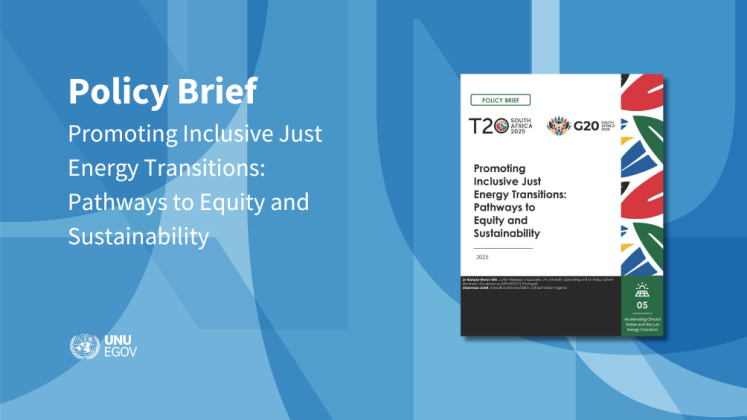A new policy brief titled “Promoting Inclusive Just Energy Transitions: Pathways to Equity and Sustainability” has been published as part of Task Force 5 (TF5) of T20 South Africa 2025. The publication is co-authored by Mercy Erhi Makpor, Junior Research Associate at the United Nations University – Operating Unit on Policy-driven Electronic Governance (UNU-EGOV), and Juliet Ukanwosu, Executive Director and Editor of Extractive360 (Nigeria).
The brief examines the challenges and opportunities of advancing an inclusive and just energy transition in developing economies, with a focus on ensuring that vulnerable groups, including women, youth, Indigenous communities, and workers in carbon-intensive industries, are not left behind.
Based on case studies from South Africa, Indonesia, and Colombia, the brief highlights innovative approaches, from multilateral financing and social protection policies to participatory governance models that promote inclusive and sustainable energy transitions.
The policy brief aligns with global climate commitments, including the Paris Agreement and the Sustainable Development Goals (SDGs), particularly SDG 7 (Affordable and Clean Energy) and SDG 13 (Climate Action). It identifies best practices for integrating social protection mechanisms into energy policies, fostering public-private partnerships for inclusive transitions, and leveraging innovative technologies to improve access to renewable energy.
Building on these insights, the authors put forward three policy recommendations: the creation of targeted financial mechanisms to support marginalized groups, the implementation of capacity-building initiatives to reskill workers in the fossil fuel sector, and the establishment of inclusive governance structures that ensure meaningful civic participation.
These recommendations aim to strengthen the G20’s role in promoting equitable and sustainable energy transitions across the Global South, providing a holistic approach that balances environmental imperatives with socio-economic equity.
The full policy brief is available for download here.


